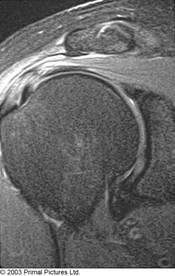ROTATOR CUFF TENDINOPATHY
To understand the injuries that can occur to tendons of the shoulder, a brief understanding of normal tendon structure is required. A tendon is a tough band off fibrous connective tissue that usually connects muscle to bone.
In response to physical training, the metabolism in tendons changes and, as such, the tendon will adapt to the greater demands placed on this soft tissue. The tendons exhibit an increase in cross sectional area and tensile strength and there is also an increase in collagen type I synthesis produced by the tenocytes in the extracellular matrix of the tendon.
Inappropriate physical training or repetitive overuse/cumulative trauma can also lead to collagen synthesis. However, in the absence of complete repair to the tendon, it has been proposed that tenocytes react by producing a greater amount of ground substance and type 3 collagen (rather than type 1) in the extracellular matrix of the tendon.
This in turn makes the tendon structure thicker with a greater concentration of nerve and blood vessels (neovascularisation). This pathological cycle can in time lead to degenerative changes in the tendon, not only increasing the pain sensitivity of the tendon, but also weakening the tendon and making it more susceptible to tears and ruptures.
This cycle of events can occur in any tendon, but is particularly common in specific sites such as the rotator cuff tendons, Achilles tendon and the Extensor Carpi Radialis Brevis tendon (tennis elbow).
ROTATOR CUFF TENDINOPATHY (SUPRASPINATUS)
In the past, clinically, rotator cuff tendinopathies were referred to as “tendinitis”, but this has since been replaced by the terms tendinopathy and tendinosis. Although inflammation may play a role in the initial pathogenesis of a tendinopathy, recent tendon research has uncovered that there is little or no evidence of inflammatory changes in the vast majority of tendon complaints and may explain why anti-inflammatory measures such NSAIDS (neurofen/ibruprofen) and ice have little effect.
The causes of tendinopathies are not fully understood, although it has been linked to impingement syndrome, overuse/trauma, the aging process, gender, weight/waist girth, cardiovascular and metabolic factors

(The list of conditions given above and subsequent explanations are intended as a general guide and should not be considered a replacement for a full medical examination. Furthermore, we do not purport to treat all the conditions listed. Should you wish to discuss any of these conditions with our chiropractors, please do not hesitate to phone the clinic on 020 7374 2272 or email enquiries@body-motion.co.uk).
Our team of chiropractors and massage therapists are on hand to answer any questions you may have, so get in touch today via enquiries@body-motion.co.uk or on +44 (0)20 7374 2272.
